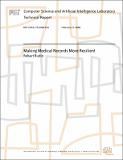Making Medical Records More Resilient
Author(s)
Rudin, Robert
DownloadMIT-CSAIL-TR-2008-010.pdf (373.4Kb)
Additional downloads
Other Contributors
Clinical Decision-Making
Advisor
Peter Szolovits
Metadata
Show full item recordAbstract
Hurricane Katrina showed that the current methods for handling medicalrecords are minimally resilient to large scale disasters. This research presents a preliminary model for measuring the resilience of medical records systemsagainst public policy goals and uses the model to illuminate the current state of medical record resilience. From this analysis, three recommendations for how to make medical records more resilient are presented.The recommendations are: 1) Federal and state governments should use the preliminary resiliencemodel introduced here as the basis for compliance requirements for electronicmedical record technical architectures. 2) Regional Health Information Organizations (RHIOs) should consideroffering services in disaster management to healthcare organizations. This willhelp RHIOs create sustainable business models. 3) Storage companies should consider developing distributed storagesolutions based on Distributed Hash Table (DHT) technology for medical recordstorage. Distributed storage would alleviate public concerns over privacy withcentralized storage of medical records. Empirical evidence is presenteddemonstrating the performance of DHT technology using a prototype medicalrecord system.
Date issued
2008-02-17Other identifiers
MIT-CSAIL-TR-2008-010
Collections
The following license files are associated with this item: